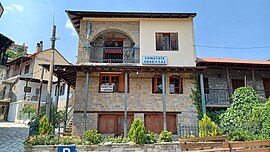Avdella (original) (raw)
From Wikipedia, the free encyclopedia
"Avdhela" redirects here. For the Aromanian digital library and cultural initiative, see Avdhela Project.
Municipal unit in Greece
| Avdella Αβδέλλα_Avdhela_ | |
|---|---|
| Municipal unit | |
 Village hall of Avdella Village hall of Avdella |
|
  AvdellaLocation within the regional unit AvdellaLocation within the regional unit  |
|
| Coordinates: 40°01′N 21°08′E / 40.017°N 21.133°E / 40.017; 21.133 | |
| Country | Greece |
| Administrative region | Western Macedonia |
| Regional unit | Grevena |
| Municipality | Grevena |
| Area | |
| • Municipal unit | 43.243 km2 (16.696 sq mi) |
| Elevation | 1,300 m (4,300 ft) |
| Population (2021)[1] | |
| • Municipal unit | 73 |
| • Municipal unit density | 1.7/km2 (4.4/sq mi) |
| Time zone | UTC+2 (EET) |
| • Summer (DST) | UTC+3 (EEST) |
| Postal code | 510 32 |
| Area code(s) | +30-2462 |
| Vehicle registration | ΡΝ |
Avdella (Greek: Αβδέλλα; Aromanian: Avdhela) is a village and a former municipality in Grevena regional unit, Western Macedonia, Greece. Since the 2011 local government reform, it has been a municipal unit of Grevena.[2] It is a seasonal Aromanian (Vlach) village.[3][4][5] Located in the Pindus mountains at 1250–1350 metres altitude, its summer population is about 3000 and in the winter there are only a few residents. The 2021 census recorded 73 inhabitants.[1] It is notable as the birthplace of the Manakis brothers, and appears in the opening sequence of the film Ulysses' Gaze. The community of Avdella covers an area of 43.243 km2.[6]
Panorama of the village Avdella. 1898. Photo taken by Manaki Brothers (Damaged glass plate)
The first foundation of Avdella remains unknown. Perhaps it was connected to the creation of settlements on the mountain range of Smolikas with the delivery of veterinary surgeon activity of region.[_clarification needed_] In the beginning, Aromanian families created small family settlements which were fused and became a single settlement such as current Avdella. The foundation and the growth of Avdella is associated with the rise of livestock-farming taking into account the pastoral habits of the locals. Before 1800, the village was situated in the "Fântîne", but the residents, mostly large families of Aromanian shepherds moved to the current position due to better climate.[_citation needed_]
Under Ottoman rule, Avdella was in the kaza of Grevena, Sanjak of Serfice (modern Servia), Vilayet of Monastir (modern Bitola).
The first Romanian school in the region of modern Greece was founded in Avdella in 1867 by local Aromanian Apostol Mărgărit.[7]
Some authors claim that Avdella was a center of pro-Romanian sentiment in the beginning of the 20th century, contributing figures such as Apostol Mărgărit. It was burned in October 1905 by Greek antartes because of this.[8] Contributing leaders such as Zisis Verros in Macedonian Struggle were fighting for the Greek cause.
On 14 July 1944, the village was burned again by a group of German Nazis, during their retreat.[_citation needed_]
Historical population
| Year | Pop. | ±% |
|---|---|---|
| 1928 | 86 | — |
| 1940 | 424 | +393.0% |
| 1951 | 6 | −98.6% |
| 1961 | 2 | −66.7% |
| 1971 | 4 | +100.0% |
| 1981 | 360 | +8900.0% |
| 1991 | 130 | −63.9% |
| 2001 | 12 | −90.8% |
| 2011 | 280 | +2233.3% |
| 2021 | 73 | −73.9% |
| Source: Stamatelatos,[9] ELSTAT[6][10][1] |
Bust of the Manaki brothers in Avdella
- Archimandrite Averchie (1806/1818–?), monk and schoolteacher
- Ioan D. Caragiani (1841–1921), folklorist and translator
- Yanaki and Milton Manaki (1872–1954 and 1882–1964), photography and cinema pioneers
- Apostol Mărgărit (1832–1903), educator and activist
- Pericle Papahagi (1872–1943), historian and folklorist
- Tache Papahagi (1892–1977), folklorist and linguist
- Nuși Tulliu (1872–1941), poet and prose writer
- Zisis Verros (1880–1985), chieftain of the Macedonian Struggle
- Avdhela Project, an Aromanian digital library and cultural initiative named after the Aromanian name of Avdella (Avdhela)
- ^ a b c "Αποτελέσματα Απογραφής Πληθυσμού - Κατοικιών 2021, Μόνιμος Πληθυσμός κατά οικισμό" [Results of the 2021 Population - Housing Census, Permanent population by settlement] (in Greek). Hellenic Statistical Authority. 29 March 2024.
- ^ "ΦΕΚ B 1292/2010, Kallikratis reform municipalities" (in Greek). Government Gazette.
- ^ Sarantis, Theodoros (1987). "Τα Γρεβενά (Συμβολή στην ιστορία τους)". Makedonika (in Greek). 26: 247.
- ^ Chang, Claudia (1993). "Pastoral Transhumance in the Southern Balkans as a Social Ideology: Ethnoarcheological Research in Northern Greece". American Anthropologist. 95 (3): 691. "Vlachohoria, or the four famous Koutsovlach villages of Grevena–Samarina, Perivoli, Avdella, and Smixi–are described as the summer villages of the Koutsovlach, where Aroumani is spoken."
- ^ Ntassiou, Konstantina; Doukas, Ioannis D. (2019). "Recording and mapping traditional transhumance routes in the South-Western Macedonia, Greece". GeoJournal. 84 (1): 165. "The four Vlach villages of Grevena (Perivoli, Avdella, Smixi, Samarina)"
- ^ a b "Population & housing census 2001 (incl. area and average elevation)" (PDF) (in Greek). National Statistical Service of Greece. Archived from the original (PDF) on 21 September 2015.
- ^ Ласку, Стоjка. Од историjaта на ароманскиот печат во Македонија. Списаниjата "Братство" и "Светлина", Скопје 2007, с. 122
- ^ Христо Силянов. "Освободителните борби на Македония", том IІ, стр.264.
- ^ Επίτομο Γεωγραφικό Λεξικό της Ελλάδος (Geographical Dictionary of Greece), Μιχαήλ Σταματελάτος, Φωτεινή Βάμβα-Σταματελάτου, εκδ. Ερμής, ΑΘήνα 2001
- ^ "Απογραφή Πληθυσμού - Κατοικιών 2011. ΜΟΝΙΜΟΣ Πληθυσμός" (in Greek). Hellenic Statistical Authority.

